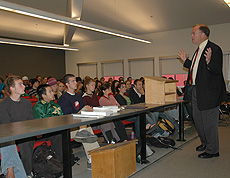October 18, 2004
Congressman Sam Farr visits class, profs
discuss Nov. 2 elections
By Jennifer McNulty
Democratic Congressman Sam Farr visited a UCSC politics course
on Friday, talking shop and fielding questions from students
before urging them to register and to vote.

Congressman Sam Farr speaks to a politics class
Photo: Jennifer McNulty
|
“We’re trying to sell democracy all over the world,
but the world questions whether we believe in our own system,”
said Farr, who represents the 17th district in the House of
Representatives.
Farr spent about 45 minutes with students in Politics 120A,
Congress, the Presidency, and the Court, an upper-division
class taught by politics professor Daniel Wirls. Farr then met
with a few faculty members and campus officials, including Acting
Chancellor Martin M. Chemers, before attending a student gathering
at the Quarry.
As the Nov. 2 election nears, Wirls and fellow campus experts
in U.S. politics agreed that the presidential debates had resuscitated
Kerry’s candidacy.
“For Kerry, the debates were unbelievably valuable, because
millions of Americans got to see him as basically an equal of
the president,” said Wirls. “For (any) challenger,
that’s terribly important. If Kerry has any chance of winning,
it’s because of the debates.”
The greatest irony of the debates is how important they were
despite rampant early skepticism about the highly structured
format, observed Michael Brown, professor of politics and chair
of the Politics Department.
“Before the debates, they were widely dismissed as a sham,
with the media calling them ‘pseudo-debates’ and spoofing
the 32-page memo that spelled out the rules,” said Brown.
“But I actually think the debates turned out to be very
informative. You really got to hear what the candidates had
to say. You got to see two sharply delineated points of view.”
Analysts and public-opinion polls agreed that Kerry dominated
all three face-offs, but Kerry’s strategy was different
during the final confrontation, according to Brown. During the
first two debates, Kerry “played to the center and was
campaigning for undecided voters,” said Brown. By the third
debate, Kerry was playing to the “base” of the Democratic
Party.
“He was talking about the minimum wage, single women,
taking a stand on Roe vs. Wade, and discussing jobs,
health care, affirmative action, the inner cities, and poverty,”
said Brown. “He was talking to women and African Americans,
making sure the base is mobilized.”
President Bush shifted his strategy during the final debate,
too, said Brown, backing away from the negative campaigning
he’s been doing since early spring and emphasizing education
in an attempt to reclaim the mantle of “compassionate conservative.”
Although negative campaigning drives down turnout, both Brown
and Wirls predict voter turnout will be higher Nov. 2 than in
recent elections.
“This is a campaign in which the divisions and stakes are
drawing people in,” said Brown.
Both campaigns have waged energetic voter-registration drives
and are preparing major get-out-the-vote efforts, which may
prove decisive in a presidential race that remains too close
to call, said Paul Ortiz, an assistant professor of community
studies and a voting-rights expert.
“The debates transformed the campaign into a dead heat,”
said Ortiz. “I think it will come down to registration,
turnout, and who does a better job of getting out the vote.”
But Ortiz expressed deep concerns about the integrity and security
of the U.S. electoral system.
“I’m afraid I agree with Jimmy Carter’s assessment:
We’re heading toward a replay of 2000,” said Ortiz.
“What I’m seeing is a pattern of election officials
trying to suppress registration activity and purging the voting
lists. Some of the stories are anecdotal, but the anecdotes
are really starting to add up.”
As reports of intimidation and voter suppression come in from
around the country, Ortiz noted that delegations of volunteers
are organizing to keep an eye on the polls.
“We’re hearing about people going out to polling places
to counter official voter suppression--activities like state
trooper cars being parked at polling places,” said Ortiz.
“If so, that might help.”
Return to Front Page